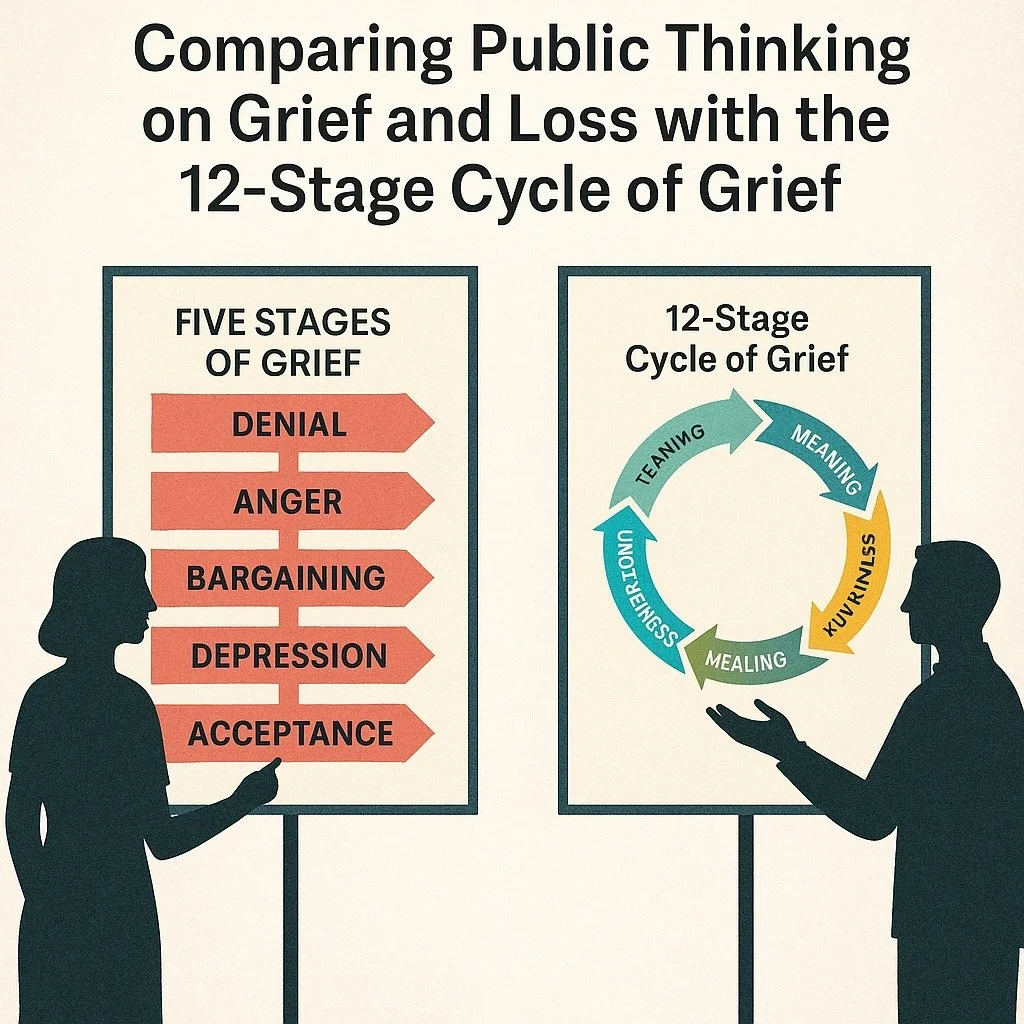Read MoreGrief is more than sadness—it’s a cycle we move through again and again as we adapt to life’s losses.
With the help of AI as my typist, this piece introduces the 12-Stage Cycle of Grief: a non-linear, emotionally rich model that recognises how grief pulls us backward before we move forward. From shock and betrayal to identity crisis, healing, and joy, this guide offers a deeper understanding of how we truly grieve—not just after death, but after any meaningful change.
Rooted in both personal loss and professional counselling experience, this cycle maps how grief feels, why it lingers, and how we can navigate it with compassion and clarity.
Grief isn’t a straight line—and as therapists, we know our clients’ journeys are anything but simple.
My 12-Stage Cycle of Grief is a practical, dynamic model designed for real therapy: mapping the messy, looping process of loss, with tools for before/during/after assessment and emotionally intelligent, collaborative reflection.
Built on 15 years’ experience and classic grief theory, it’s made for those working with bereavement, end-of-life, or any deep loss.
Read MoreWant meaningfulness? For five decades, the five-stage model has dominated our thinking about grief. But what if it’s missing the true complexity of how humans experience loss?
Drawing on fifteen years of frontline therapeutic practice, Paul Roebuck introduces the 12-Stage Cycle of Grief, a model designed to reflect the real, messy, cyclical nature of adaptation to loss.
This is a challenge, and an invitation to students, academics, and research teams: help us rigorously test, validate, and expand this new approach, and be part of shaping the future of grief science.
Read MoreRead MoreGrief isn’t always loud or obvious. It doesn’t only follow death. Sometimes, it hides in tiredness, restlessness, or the feeling that something is missing.
With the help of AI as my typist, this article explores the subtle signs of grief you might be overlooking — and how they map to a powerful 12-stage cycle. Whether you’ve lost a person, a dream, your health, or your sense of self, this guide helps you recognise, name, and navigate what you’re feeling.
Read MoreGrief isn’t something we “get over”—it’s something we move through.
This guide helps you recognise where you are in the grief cycle and how to move forward with intention, without rushing or skipping steps. Learn how to honour each stage, gain momentum, and walk the path toward healing—one conscious step at a time.
Read MoreThis Q&A guide was developed in collaboration with GPT-4, OpenAI’s advanced language model, drawing on therapeutic insights and lived emotional truths.
It explores 15 essential questions about grief and loss—ranging from how to recognise grief, to how it affects the body, mind, and relationships. The answers are grounded in the 12-Stage Cycle of Grief, offering language, perspective, and practical support for anyone navigating loss—whether personal or professional.
Whether you’re grieving yourself, supporting someone who is, or teaching others about grief, this guide offers clarity, compassion, and a pathway to healing.
Read MoreGrief doesn’t move in a straight line. It arrives in waves—pulling us under, then releasing us back to the surface, often without warning. One moment you feel steady, the next you’re overwhelmed by memory or loss.
With the help of AI as my typist, this piece explores how grief flows through us across time, showing up in hours, days, or even years after loss. It offers a compassionate guide to recognising the stage you’re in and understanding the rhythm of grief—so you can stop fighting the tide, and learn to move with it.
Read MoreGrief isn’t just about death—it’s about any meaningful loss. From broken relationships to fading dreams, from lost health to the life we never got to live, grief takes many forms.
With help from AI as my typist, this article explores the quieter, less recognised faces of loss—and why they matter. Because if something shaped your identity, its absence can reshape you. And that, too, is grief.
Read MoreMany people know the Five Stages of Grief—but real grief doesn’t follow neat steps.
With the help of AI as my typist, this article compares major public grief models (Kübler-Ross, Worden, and the Dual Process Model) with the 12-Stage Cycle of Grief—a modern, cyclical approach rooted in therapy practice.
Explore how this model brings deeper emotional accuracy, recognises identity loss, and reshapes how we talk about grief today.









